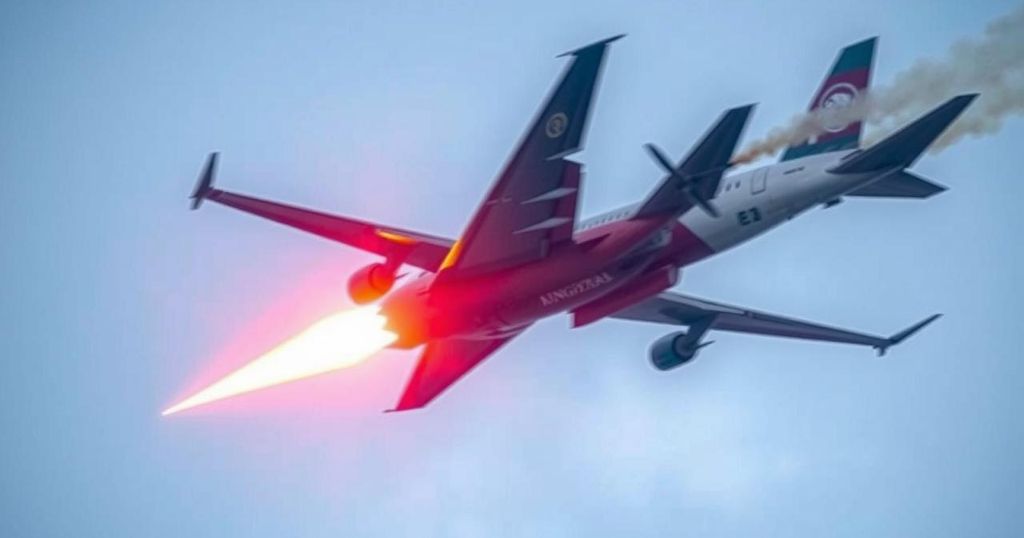Investigation Underway for Azerbaijani Airline Crash Amid Missile Claims
An Azerbaijani passenger jet crash, resulting in 38 fatalities, is suspected to have been caused by a Russian missile. Major investigations are underway as the Kremlin warns against speculation without conclusive evidence. Eyewitness accounts and U.S. official statements suggest military involvement, raising concerns over air safety in conflict regions.
Recent discussions have emerged regarding the tragic crash of an Azerbaijani passenger airline, which resulted in extensive casualties. Preliminary investigations led by Azerbaijani and U.S. officials suggest that a Russian surface-to-air missile may have been responsible for the disaster. The Azerbaijan Airlines Embraer 190, which was en route from Baku to Grozny, diverged from its intended path and ultimately crashed near Aktau, Kazakhstan, claiming the lives of 38 of the 67 individuals on board. Eyewitness reports and expert analysis indicate the possibility of the aircraft being struck by shrapnel from a missile linked to the Pantsir-S air defense system. Following the crash, the Kremlin has urged against speculation, emphasizing the need for a thorough investigation.
As investigations unfold, the chaos surrounding the incident highlights the complicated geopolitical context in which it occurred. The Azerbaijan Airlines flight, which diverted over the Caspian Sea, appeared to veer significantly off its expected route before plunging to the ground. Initial statements made by the airline cited a bird strike as a potential cause, a claim that was later retracted in light of emerging evidence pointing to a military involvement. Amidst the tragedy, Azerbaijan’s President Ilham Aliyev declared a national day of mourning, and the region grapples with the profound impact of this calamity on numerous families.
In-depth investigations are currently being conducted, which includes the retrieval of two black boxes, crucial for understanding the flight’s final moments. U.S. intelligence has suggested that the aircraft was likely downed by an errant missile within an area known for conflicts involving Ukrainian military operations. Eyewitness accounts have provided harrowing details of the survivors’ experiences following the crash, with reports stating they suffered severe injuries and were traumatized.
The plight of those affected has been met with condolences from various leaders, including Russian President Vladimir Putin, who expressed his sorrow during a conversation with President Aliyev. The outcome of investigations remains critical, as the international community awaits findings that could have implications for regional relations and air travel safety in conflict zones. Moving forward, the focus will be on delivering justice for the victims’ families and adequately addressing the underlying issues that led to this heartbreaking incident.
The recent crash of an Azerbaijani passenger jet has raised serious concerns about air safety in conflict-prone regions, particularly regarding potential military engagements affecting civilian flights. The aircraft was reportedly intercepted by a missile, leading to speculation about Russia’s military capabilities and their operational context in regard to the ongoing tensions in Ukraine. This incident not only underscores the risks faced by civilian aviation but also highlights the immediate need for comprehensive investigations into military activity in surrounding territories, including careful analysis of air defense systems in use. Previous similar incidents, such as the downing of Malaysia Airlines flight MH17, draw attention to the importance of regulatory frameworks governing military operations near air traffic routes.
In summary, the crash of the Azerbaijani passenger jet has resulted in significant loss of life and raised serious questions regarding military involvement in conflicts affecting civilian aviation. As investigations proceed, findings will likely influence international policies related to air safety and military engagement in populated areas. The tragedy has galvanized diplomatic dialogues around the implications of military operations and their repercussions on innocent lives, with global leaders expressing their condolences and calling for accountability.
Original Source: www.wfxg.com




Post Comment